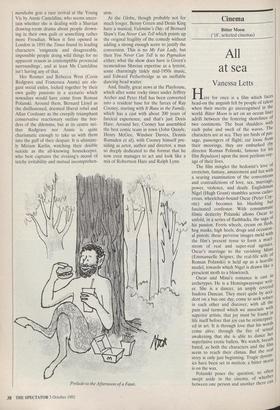Cinema
Bitter Moon ('18', selected cinemas)
at sea
Vanessa Letts
Here for once is a film which faces head-on the anguish felt by people of talent when their merits go unrecognised in the world. Bitter Moon is set on an ocean liner adrift between the festering shorelines of two continents. The boat shudders with each pulse and swell of the waves. The characters are at sea. They are birds of pas- sage, passengers of flight; cut loose from their moorings, they are embarked (by director Roman Polanski, famous for his film Repulsion) upon the most perilous voy- age of their lives. The film mingles the hedonist's love of eroticism, fantasy, amazement and fun with a searing examination of the conventions and contradictions of love, sex, marriage, power, violence, and death. Englishman Nigel (Hugh Grant) stumbles across cadav- erous, wheelchair-bound Oscar (Peter Coy- ote) and becomes his blushing but fascinated confessor. With consummate filmic dexterity Polanski allows Oscar to unfold, in a series of flashbacks, the saga of his passion. Ferris wheels, cream on flesh, hog masks, high heels, drugs and occasion- al pistols: these perverse images meld with the film's present tense to form a mael- strom of real and super-real agonies: Oscar's marriage to the ravishing Mimi (Emmanuelle Seigner, the real-life wife of Roman Polanski) is held up as a horrific model, towards which Nigel is drawn like a prescient moth to a blowtorch. Oscar and Mimi's romance is cast in archetypes. He is a Hemingwayesque writ- er. She is a dancer, an amply covered Isadora Duncan. They meet quite by acci- dent on a bus one day, come to seek solace in each other and discover, with all the pain and turmoil which we associate with superior artists, that joy must be found 01 life itself before that joy can be reinterpret- ed in art. It is through love that his words come alive; through the fire of sexual awakening that she is able to dance her superlative erotic ballets. We watch, breath bated, as both the characters and the film seem to reach their climax. But the real story is only just beginning. Tragic dynam- ics have been set in motion; a bitter moon is on the wax. Polanski poses the question, so often swept aside in the cinema, of whether between one person and another there can in fact be too much passion. He is candid about the love that exists in hatred. He is forthright about the dissolution which inevitably creeps into a heavily sexual rela- tionship. It is his triumph to have given us a Last Tango in Paris for the Nineties, one which incorporates all the superciliousness and otiose emptiness which we have come to know and mistrust in the scenery of. modern life.
By the time we meet Oscar and Mimi on the boat they are staggering under the weight of physical and moral dysfunction. She has rendered him irreversibly impo- tent. He has rendered her irreversibly ster- ile. This wasteland which they now inhabit is mirrored in the souls of the English cou- ple (including Nigel's wife Fiona, played by Kristin Scott-Thomas); but for these two there is hope. Tangled up in a web of unsuspected perversion and desire, they are able to glimpse possibilities which they have not previously been able to acknowl- edge (including lesbianism) and even, at the end, to dream of salvation.
The film depicts the death of one pair of lovers and the birth of another. In one way Bitter Moon is an answer to Who's Afraid of Virginia Woolf? (another great infertility drama), with a message of hope for the younger couple which Edward Albee clear- ly didn't, in his version of the story, feel able to allow. Rarely do films about child- lessness avoid being mawkish, but Bitter Moon dares to be different. A Franco- American flame warms the English sangfroid. At the very end new horizons beckon. It is no accident that the surviving lovers are from these shores: the film is, in Parr, a hymn to the British, a gesture of affection, even, surreptitiously perhaps, a confession of respect for the solid old virtues which foreigners find it so easy to mock. For anyone who has ever felt desire, or the secret hankering to be recognised as an artist, this is a film not to be missed.
ROADWORKS FOR 8m. AHEAD MAX SPEED 200,41.
'I'll have to pull over, I need a hard shoulder to cry on.'



















































 Previous page
Previous page